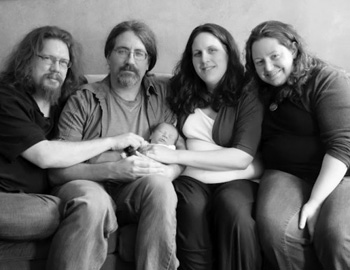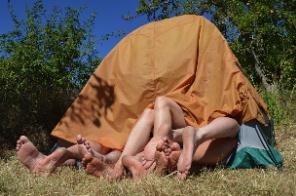 Offbeat Mama is a site that celebrates non-traditional families and parenting, but even still, it is pretty remarkable that they included a birth story from a man in a polyamorous quad. More than anything else, it is a moving story from the perspective of an awestruck partner. But there are a few moments where the particulars of being poly do shine through:
Offbeat Mama is a site that celebrates non-traditional families and parenting, but even still, it is pretty remarkable that they included a birth story from a man in a polyamorous quad. More than anything else, it is a moving story from the perspective of an awestruck partner. But there are a few moments where the particulars of being poly do shine through:
The next few hours were a blur. Aimee's contractions were almost non-stop at this point. Barbara and Aimee would harmonize through her contractions, and eventually we all took it up, taking turns being her physical and emotional support.
. . . Aimee started pushing at 3:58pm. Ian supported her upper body, Mich and I stood on both sides. The nurses faded into the background. Barbara helped with ice, but from here on out, our family was pretty much running the show. With each contraction, Aimee pushed, with very little coaching or encouragement. More fluid came out, more harmonizing happened.
. . . Our son entered into this world, caught safely in the hands of his father and his little mother together, while his Dad-E held his mother safe and strong. Afterward her three partners milled about in stunned pleasure, alternating between taking pictures and stares of pleased bewilderment. And lots of hugs and tears.
Unlike most articles posted on non-poly-focused sites, the comments section is full of folks praising the story and the family. There is even some discussion of poly-specific parenting and birthing concerns. Check it out!

